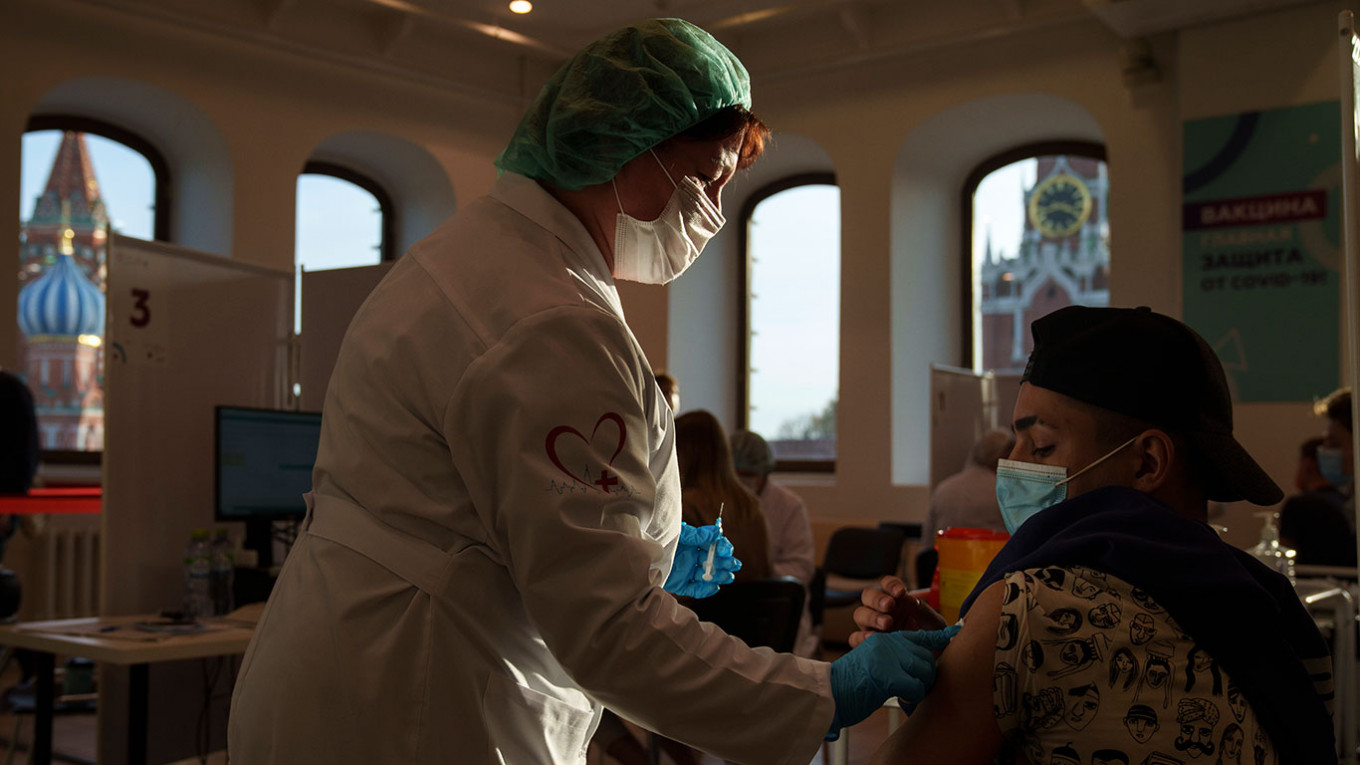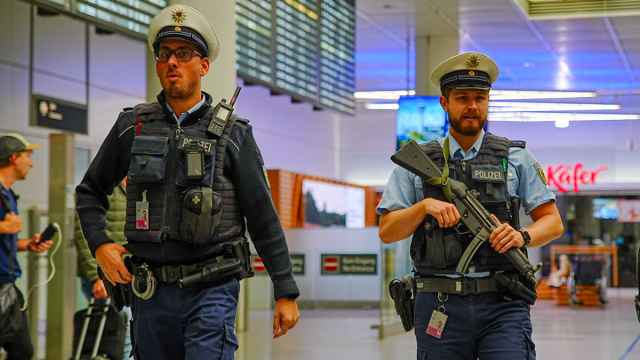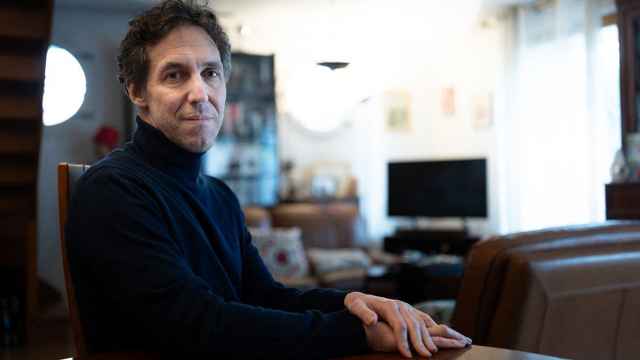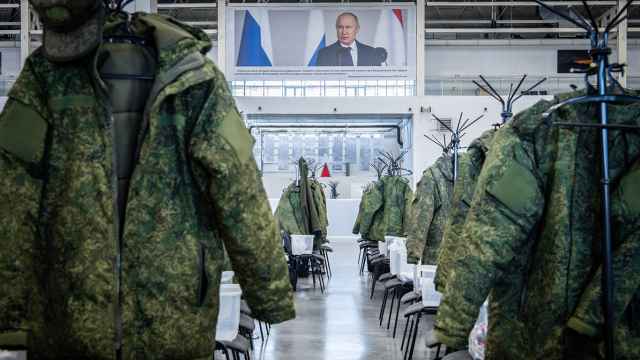Russia started the year with fewer Covid restrictions than the West and the belief that its newly registered Sputnik V vaccine would put pandemic woes behind it.
But a fresh coronavirus wave in the summer was followed by an even more devastating surge in the fall fueled by the Delta variant, which saw Russia registering record cases in deaths and infections.
And while Europe and the U.S. managed to curb their death tolls with the aid of mass vaccination campaigns, Russia was unable to follow suit, in large part due to widespread vaccine skepticism.
By December, the country had registered over 900,000 excess fatalities since the start of the year, according to The Moscow Times calculations, and experts believe the number could hit the grim milestone of one million excess deaths by the end of the year. Independent demographers believe that Russia’s natural population — excluding the effects of migration — has seen its largest decline since World War II.
Russia’s leadership admitted in November for the first time during the pandemic that its excess mortality rate — a measure comparing total fatalities from all causes with a pre-pandemic baseline that is seen by demographers and statisticians as the most reliable indicator of lives lost to the pandemic — was directly linked to Covid-19.
The fourth wave, which started in October, was especially deadly for the country, with hospitals once again overflowing and doctors raising the alarm. In the worst-hit month of October, the country saw 3,000 excess deaths a day.
While daily infections and deaths have waned as the year-end approaches, virologists have warned that the country should prepare for new deadly waves in the new year, with the more infectious omicron variant gaining ground in a country where only 40% of the population is fully vaccinated.
Vaccine diplomacy backfires
As 2021 dawned, Russia, under the direction of its vaccine’s developer the Russian Direct Investment Fund (RDIF), was eager to boost the nation’s image through so-called vaccine diplomacy. But Sputnik V’s champions quickly found themselves embroiled in a string of scandals.
In Slovakia and Brazil, the nation’s health regulators said they could not evaluate the risks and benefits of the vaccine due to a lack of data and inconsistencies in dosages.
Argentina, one of the biggest buyers of Sputnik V, on multiple occasions, complained it was in a “very critical situation” as it faced shortages of second doses, which Russia said were more difficult to produce than the first ones. Guatemala also faced shortages, and in July canceled an order for eight million doses because of previous delays.
The Moscow Times also investigated a secret scheme through which the RDIF granted a minor UAE royal exclusive rights to resell Sputnik V to at least five developing countries at a significant mark-up.
The scheme led to a series of scandals in Lebanon, Kenya and Pakistan while Ghana’s parliament opened an official hearing following the reports.
In 2022, Russia is hoping its growing partnership with India — a vaccine-producing powerhouse — will help solve the production issues. The RDIF has already promised to produce an impressive 3 billion doses of Sputnik V next year, as well as “several hundred million Sputnik Omicron boosters” to protect the world against the new strain.
But for Sputnik V and other Russian vaccines to be accepted globally, EU and World Health Organization (WHO) approval is critical.
At the start of the year, the WHO said its review of how Russia produces the Sputnik V coronavirus vaccine had found some issues with the filling of vials at a plant.
Both the EU and the WHO have since said Russian manufacturers have yet to provide regulators with missing data for their ongoing review.
Kremlin spokesperson Dmitry Peskov in December said Russia had a “different understanding of what information was needed” for approval.
2022, the year of mass vaccination?
Throughout 2021, the Kremlin grappled with the nation’s stubborn refusal to vaccinate, prompting Russian President Vladimir Putin, who received Sputnik V vaccine early in year, to complain in a public meeting in October that he “can’t understand what’s going on.”
“We have a reliable and efficient vaccine. The vaccine really reduces the risks of illness, grave complications and death,” he added.
Some critics have blamed the country’s leadership for vaccine skepticism, accusing the government of prioritizing its domestic agenda over the battle against the pandemic. At the height of the summer 2020 wave of infection, Moscow suddenly dropped all restrictions to push through a referendum on constitutional changes that allowed Putin to run for further terms as president, declaring that covid had been defeated.
And later in the summer, a short-lived QR code program in Moscow and other cities was quickly abandoned after opposition from restaurateurs ahead of important elections to the Duma, Russia’s lower house of parliament.
In the background, state-owned media were downplaying the pandemic and ridiculing other nations for their harsh lockdowns.
Others say Russia’s low vaccination rate is part of a wider regional phenomenon, as other post-soviet nations including Ukraine and Armenia are also struggling to convince their populations to get the jab.
The Kremlin can take some encouragement from a recent Levada poll showing the percentage of Russians willing to be vaccinated against the coronavirus rose from 15% in August to 19% in October, the highest number since the start of the pandemic. Levada also found that 42% of Russians were in favor of universal mandatory vaccination — up from 38% in June.
Still, most of the country remains unvaccinated and Russia's vaccination rate has recently started to fall, after hitting a record 400 thousand doses a day during a short lockdown in November.
A number of high-placed officials and top doctors have said that without a new and forceful push that would include nationwide mandatory vaccination, the country is unlikely to hit its target of 70% vaccinated.
But Putin, whose electoral rating declined during the second half of 2021, has been wary of throwing his full backing behind unpopular Covid measures and has repeatedly said he is not in favor of forced vaccination and widespread QR codes.
The Duma has already announced that it will scrap a proposed bill requiring QR codes to access public transport after criticism from Putin. It remains to be seen if Covid passes and other restrictions will be widely introduced across the country in 2022.
A Message from The Moscow Times:
Dear readers,
We are facing unprecedented challenges. Russia's Prosecutor General's Office has designated The Moscow Times as an "undesirable" organization, criminalizing our work and putting our staff at risk of prosecution. This follows our earlier unjust labeling as a "foreign agent."
These actions are direct attempts to silence independent journalism in Russia. The authorities claim our work "discredits the decisions of the Russian leadership." We see things differently: we strive to provide accurate, unbiased reporting on Russia.
We, the journalists of The Moscow Times, refuse to be silenced. But to continue our work, we need your help.
Your support, no matter how small, makes a world of difference. If you can, please support us monthly starting from just $2. It's quick to set up, and every contribution makes a significant impact.
By supporting The Moscow Times, you're defending open, independent journalism in the face of repression. Thank you for standing with us.
Remind me later.






